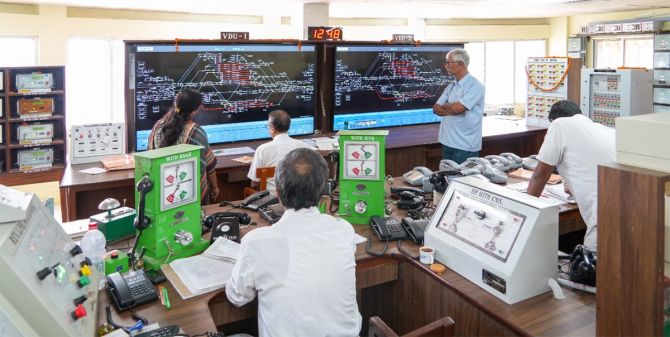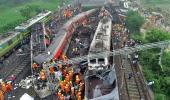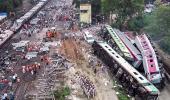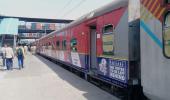'To avoid accountability and cover the mismanagement of the head of the department, they create this kind of sabotage theory.'
'If it's a sabotage theory, then the higher-level officials can go scot-free.'

The three train collision that resulted in the deaths of 288 people is the worst train accident in India this century.
A week later, various theories are floating around about the cause of the accident.
Was it a technical error? Or a human error? Or sabotage?
The initial investigation claimed a technical error resulted in the accident. Then the CBI entered the scene. Now, they are talking about sabotage.
How unsafe does a loco pilot feel in situations like these? In what kind of conditions do they work?
K Parthasarathi, a loco pilot and the south zone joint general secretary of the All India Loco Running Staff Association, reveals the problems loco pilots face.
"When you increase the speed from 100 kmph to 130 kmph, you should understand that my reaction time as a loco pilot becomes very limited. At 130 kmph, I pass 1 km in 28 seconds! Imagine how much time I get for any reaction," Parthasarathi tells Rediff.com's Shobha Warrier.
"We are not against running Vande Bharat or Bullet trains. Along with this, you should reduce human dependence on the controls," says Parthasarathi in the first of a two-part interview.

Various theories are going around about the train accident. Will we ever know the truth?
It is very difficult to answer. Yes, technical errors can happen.
This is not the first time that the electronic interlocking system has failed. It has failed many times earlier also. It is not an unusual happening.
The difference this time is that it has caused such a big accident where hundreds of people died and more than a thousand injured.
The interlocking system is there to ensure safety. For example, if a line is occupied, the signal will be red. But the electronic interlocking system failing is very much possible.
In the old days, the interlocking arrangement was done by people who operated a lever point, and the signal was cleared by the station master. Yes, too many people were involved in the system in those days.
After the introduction of the electronic interlocking system, all those people became redundant. Now, only the station master is there. There is a relay room at the station near the station master's room and that's where all the operations happen.

Can anyone enter the room and sabotage the system?
In this particular case, we have no idea what happened. But the chances of sabotage are very remote.
Sometime back, a retired general manager said that if anyone wanted to sabotage, he would not try to enter the room located at a station where there are many people. They would prefer a faraway place where they are not seen.
When someone who wants to sabotage a train can tamper with the track in some remote area, will he take the risk of going to the station?
Also, it is not easy to understand the complicated electronic system.
But there may be some intention behind this sabotage theory.

To make someone a scapegoat?
Exactly. Accountability in the Indian Railways ends with lower-level employees. It never goes beyond the Supervisor level; mostly Group D staff or, it goes up to the Supervisor level. Not beyond that.
To avoid accountability and cover the mismanagement of the head of the department, they create this kind of a sabotage theory.
If it's a sabotage theory, it is concerned with security, law and order of the state, etc. Then, the higher-level officials can go scot-free.
I am talking about the sabotage theory based on media reports.

Do you feel those at the very top like the railway minister, the chairman of the Railway Board, GM, etc should resign taking moral responsibility?
Asking for resignations is always political.
For quite some time, in the Railways, they have been talking about 'graded responsibility', which is, the responsibility goes up with higher grades. But in practical terms, the graded responsibility is not applied at all.
For example, in Indian law, there is something called vicarious liability. In simple terms, it is like a master-servant relationship. It means, if the servant does something wrong, even if he is negligent, the master also is accountable.
Even though the vicarious liability law is available in the Indian Penal Code, it is not applicable in the Indian Railways.
It is absolutely essential to have graded responsibility. It is not because I have any issues with the higher officials. I am not disputing the fact that there are many officials who work day and night without any rest for the Railways.
Because there is no accountability, they are not taking sincere steps to ensure safety.
I will give you an example. After starting the Vande Bharat trains, the train speed was increased to 120-130 kmph. But what safety improvements have they made for running trains at a higher speed? Nothing.
After putting heavier gauge rails in some places and cattle fences in some other places, they are declaring the rails are suitable for 130 kmph.
When you increase the speed from 100 kmph to 130 kmph, you should understand that my reaction time as a loco pilot becomes very limited. At 130 kmph, I pass 1 km in 28 seconds! Imagine how much time I get for any reaction.
We are not against increasing the speed, we are not against running Vande Bharat or Bullet trains. Along with this, you should reduce human dependence on the controls.
You should have more of electronic surveillance and electronic monitoring. You also need sophisticated anti-collision devices.
The problem here is, they are just increasing the speed of the train without introducing modern devices.

And the end result is, the life of the loco pilot and the travelling public is in danger....
Exactly. In this accident, the driver of the Coromandel Express survived. But in many accidents, the driver does not survive. If he had died, the number of dead would have changed from 288 to 289.
In most cases, the blame falls on the driver...
Yes. To stop making the driver alone responsible for an accident, we had fought for several years to have a recorder in the engine compartment.
Like the Black Box on planes?
Yes. Like the data logger, there should be a recording of the signalling in the engine room because in most cases, we were not in a position to prove our innocence. We had to fight for so many years for this.
We work in such conditions.
Feature Presentation: Ashish Narsale/Rediff.com










